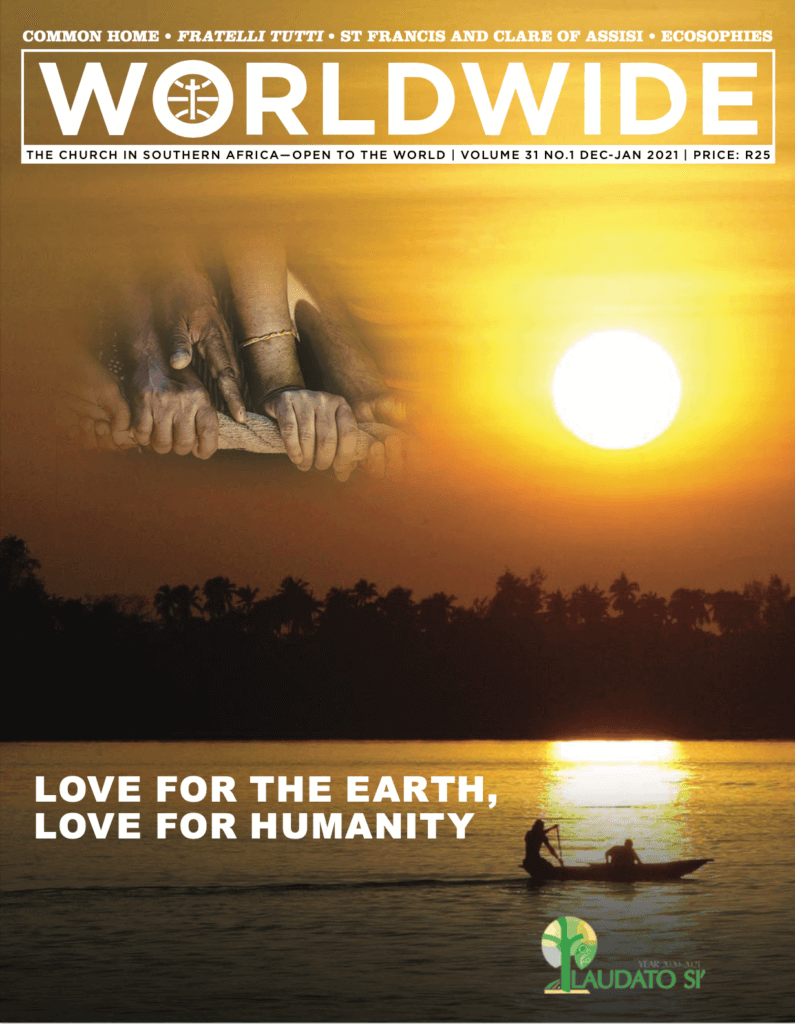
Love for The Earth,
Love for Humanity
The bright light of the rising sun represents the luminosity, the beauty inherent in each human being and our capacity to transform evil into good and to establish authentic human relationships. The closeness of the celebration of Christmas envisions the coming of the Light and Peace for the world, the One that fulfils the greatest aspirations of any person and leads us all to God.

BOREDOM GETS
A GRIP ON SOCIETY
The current worldwide wave of riots and uprisings are the result of an underground discontent that has long been breeding and triggered now by the corona crisis said the chairman of the Dutch Teilhard de Chardin Foundation, Henk Hogeboom van Buggenum in a recent interview with the author
BY PIETER BLIEK | BACHELOR OF ARTS AND MASTER OF ARTS
IN RELIGIOUS STUDIES, HOLLAND
ACCORDING TO Hogeboom, the French priest and palaeontologist, Pierre Teilhard de Chardin (1881–1955) predicted in his book, The phenomenon of Man (1976) that boredom will be the greatest threat to modern society. He also adds: “That is why it is important that everyone can get to work”.
However, what if, as a result of technological and digital advances, which is implementing a different mode of life, forty percent of jobs disappear without being replaced by new ones? This is what the Irish priest, eco-theologian and advisor to the Vatican, Sean McDonagh (in prep.), warns against in his book, Robots, religion and the future of jobs, which he is currently preparing for publication. McDonagh claims that the corona crisis is speeding up the process of robotization and digitization and that the recent riots and uprisings are only the beginning. The longer the crisis lasts the more unemployed there will be who are dissatisfied and feed the riots. According to him, the current social upheavals are a foretaste of what society will face when the tsunami of mass unemployment pours over us.
The death of the black American George Floyd as a result of racist police violence at the end of May has provoked a worldwide wave of protests and riots. Consequently, the Black Lives Matter appeared as a movement against police violence, institutional racism and other forms of aggression and oppression against black people.
However, it is not only a black persons’ revolt, also other underprivileged population groups have made their voice heard through protests and riots since then, e.g. demonstrations in deprived neighbourhoods in the big cities, all over the world. The uprisings are jokingly called corona riots. Furthermore, there has been a worldwide wave of protests against the strict corona measures and the uprising in Belarus, among others; no one can ignore the fact that there is a general discontent.
“Those riots all over the world are not separate”, says Hogeboom. “It all has to do with the burgeoning awareness that things have to be done differently in society”. He argues that the Black Lives Matter Movement can be compared to the uprising against the Belarusian dictator Lukashenko. “In Belarus, after 26 years of repression, people suddenly dare to take to the streets despite the presence of numerous police. In America, many people, mostly the black population, continues to demonstrate against police violence”. Hogeboom explains that all these uprisings are eased by the fact that most people now have a computer, a TV and a cell phone: “People see what is happening in other countries and become dissatisfied with their current situation. This is exacerbated by the corona crisis and the ongoing technological and digital advances, as a result of which many people suddenly lose their jobs, no longer have an income and get disheartened. That all works together and finds its way out by means of protests and uprisings¨.
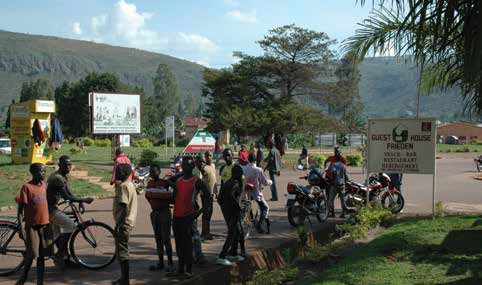
of the greatest challenges in the years to come—Ruyigi, Burundi.
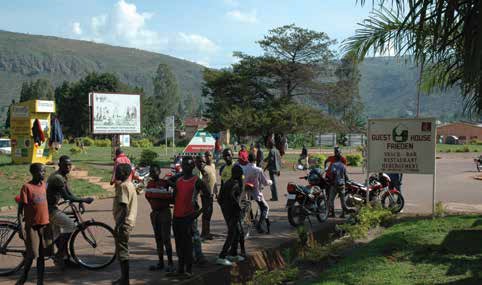
in the employment patterns experienced till now.
Teilhard de Chardin was highly controversial. He tried to reconcile Christian faith with the evolution theory. Neither the Catholic Church nor science thanked him for this. Teilhard claimed that matter has an interior consciousness. As Hogeboom explains: “In a certain way, the COVID-19 virus has a kind of consciousness, capable of breaking the balance in the world, when this is disturbed by environmental pollution and climate change. When, in the early 1970s, the environmental movement pointed out to us that we were on the incorrect path, nobody was interested in taking action or heeding the warning. Gradually, the awareness is growing that we are all heading in the wrong direction. Then comes the environmental and climate crisis with the corona crisis and social unrest as a result. Essentially, we all created this virus, but strangely enough, it can also become our salvation. That little piece of matter helps us to become aware that we still have to do a lot of things differently”.
According to him, “the social unrest in the United States also has to do with the fact that there is still a very large group of people who feel comfortable with the old situation and are resisting change; among others, he refers to Trump supporters. However, the underprivileged population has developed and will no longer take the oppression. Everything that is oppressed, be it people or nature, eventually rebels”. McDonagh fully agrees with Hogeboom’s view: “Particularly in American society, institutional racism is deeply rooted. It dates back to the slave era. That is why racism is an intrinsic part of American society. Here only the lives of white people matter”. The Irish priest denounces the corona approach of the richest country in the world when he says: “See how they deal with health care and social problems. Where is the American dream? No wonder the population is rebelling.”
According to the chairman of the Teilhard de Chardin Foundation, Hogeboom, a possible solution for the social unrest is the provision of a worldwide basic income. “I was already enthusiastic about this idea when I set up the foundation in the mid-1990’s and thus came into contact with the Dutch artist Pieter Kooistra. He is the founder of the Dutch Art Library”. Kooistra had written the groundbreaking Marshall Plan for all people, The ideal self-Interest, (Kooistra 1993). In it the artist argues for a basic income for everyone, but also adds a comprehensive plan to develop the talents that every human being has, so as to use them for the benefit of society. Hogeboom admits that the plan is rather idealistic, but in view of the current increasing social unrest, it is still worth considering. McDonagh affirms:
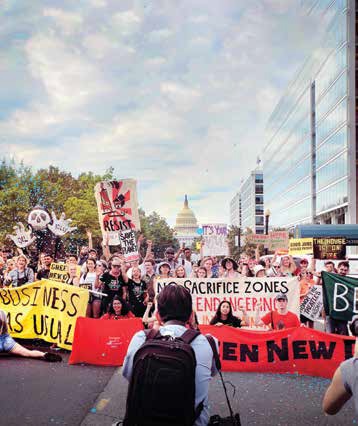
demonstration in Washington DC, USA.
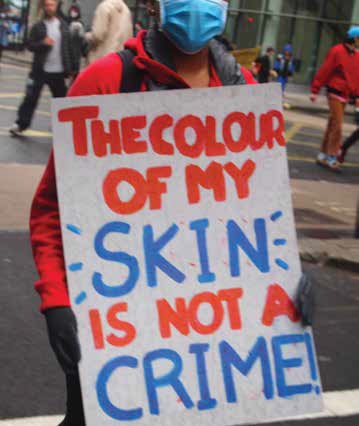
Kooistra is therefore not necessarily agreeable to the unconditional provision of a basic income. Hogeboom coincides with his view, “a precondition is that people first learn to discover who they are and how they can make a contribution. To this end, the unemployed should gather in groups and, under the guidance of a discussion leader, take stock of what kind of needs exist in society and how they can fulfil them. In this way, people can feel valuable again and make themselves helpful, and they do not have to feel useless and get bored. Insurrections and riots can possibly be prevented by this”, says Hogeboom. He attaches great value to Kooistra’s plan, because it is completely in line with the ideas of Teilhard de Chardin. Together, Hogeboom and Kooistra attended a meeting of the United Nations to present The ideal self-interest. Hogeboom states: “Due to the fact that the son of the Irish Prime Minister, Erskine Hamilton Childers, who led the meeting, became unwell at the podium and was taken unconscious to the hospital, the session was adjourned and unfortunately, Kooistra’s presentation was not completed”.
McDonagh is very much in favour of the re-evaluation of Teilhard’s ideas. Thanks to his advice, Pope Francis referred several times to the French priest in the ecological encyclical, Laudato Si’ of 2015. “In addition to caring for human wellbeing, it is also crucial to build a sustainable future if we are to survive as a species on this fragile planet. Teilhard’s ideas could serve us well in this respect”, says McDonagh. Hogeboom acknowledges that “Kooistra said just before his death in 1997, that with his plan he planted a very small seed that will eventually germinate”. Perhaps the corona crisis and the ecological crisis are fertile soils in which The ideal self-Interest can still germinate.
References
Kooistra, Pieter. 1993. The ideal self-interest. A UNO Marshall Plan for all people, Kok Agora Publishers, Kampen, The Nederlands. McDonagh, Sean. In prep. Robots, religion and the future of jobs. Teilhard de Chardin, Pierre. 1976. The phenomenon of Man. First Harper Torchbook,
New York.
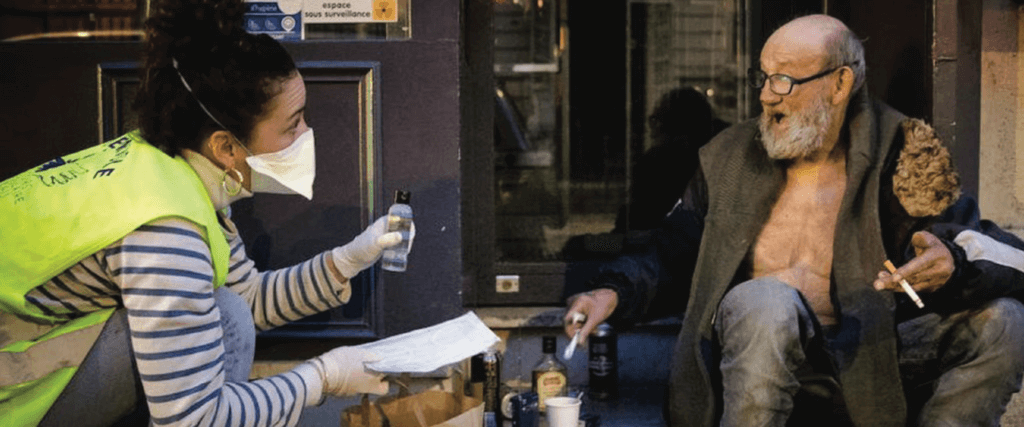
Could the Pandemic Create a Less Exclusive Economy?
THE COVID-19 pandemic has highlighted the global crises that were already there, the recognition of a dysfunctional economy and the driving force behind highly unequal societies—which favour new paths, fears and hopes, but the future remains unknown.
